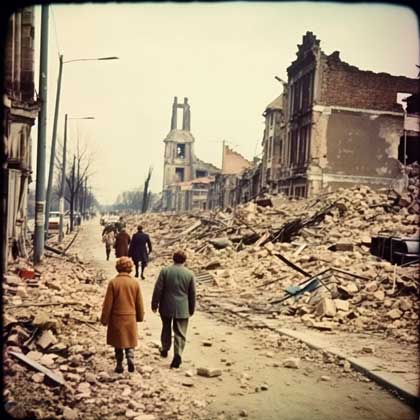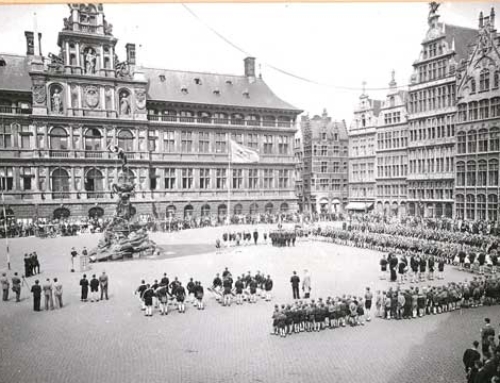Welcome back to the final instalment of our blog series based on William Shierer’s ‘Rise and Fall of the Third Reich‘, which delves into the history of Nazi Germany. If you missed the previous posts, it’s a good idea to take a moment to revisit the introduction about the book and its author, the birth of Nazi ideology, Hitler and the Nazis’ ascent to power, the blitzkrieg, the Battle of Stalingrad as the war’s turning point, and the horrors of the Holocaust.
The Fall of Nazi Germany
As the dark clouds of World War II loomed, one fact became increasingly clear: the Third Reich couldn’t endure forever. After years of power expansion, unchecked dominance, and terror, Nazi Germany began showing signs of weakness.
The Allied forces, including the UK, the US, and the Soviet Union, united their efforts to launch a counter-offensive. They achieved victory after victory against what once seemed like an invincible German force. Nazi Germany was squeezed from all sides, putting immense strain on their military and logistical capabilities.
Domestically, signs of unrest were evident. As the Allies advanced, the populace grew disheartened and the foundations of the Nazi regime began to shake. Food and other essential goods became scarce. The propaganda peddled by Nazi leaders could no longer mask the harsh reality of front-line defeats.
As the Allies finally approached the German capital, Berlin, the situation grew increasingly dire for the Nazi regime. Adolf Hitler, the architect of so much suffering, chose to end his life in a bunker beneath Berlin, avoiding facing the consequences of his actions.
This moment symbolised the definitive end of the Third Reich, but the devastation it had wrought was palpable. Countries were in ruins, cities were destroyed, and most tragically: millions of innocent lives were lost in the war and through the Holocaust’s heinous acts.
Post-War: The Nuremberg Trials
With the conclusion of World War II, a pressing question arose: how should the world handle those responsible for the unimaginable crimes of the Nazi regime? The answer was the establishment of the Nuremberg Trials.
In the war’s aftermath, amidst Europe’s rubble, the Allied powers decided that merely imprisoning or executing without a fair trial wouldn’t do justice to the war and Holocaust’s millions of victims. Instead, they aimed to set a precedent, sending a clear message that such crimes against humanity wouldn’t go unpunished.
In the German city of Nuremberg, leading Nazi officials, industrialists, military commanders, and others faced trial in a series of hearings that the world watched closely. Charges ranged from war crimes and crimes against humanity to conspiracy to wage war.
The trials were meticulously orchestrated. Witnesses testified, evidence was presented, and the defense was granted opportunities to represent their clients. What was remarkable was the Allies’ commitment to upholding the principles of law and justice, even for those who had committed such grievous crimes.
When the verdicts were delivered, sentences ranged from imprisonment to execution. But beyond mere punishment, the Nuremberg Trials served as a global reminder of the horrors stemming from unchecked power and hatred. They underscored the rule of law’s importance and the protection of individuals’ rights, even in the darkest times.
Reflecting on Lessons from Nazi Germany
The events during Nazi Germany’s reign not only serve as a grim reminder of past occurrences but also as an urgent call for introspection and future vigilance.
The Nazis’ rapid ascent highlights the unsettling speed at which extremist ideas can take root in a society, especially during economic uncertainty and social turmoil. In such times, people often seek simplistic solutions to intricate problems, and demagogues like Hitler can exploit this unrest.
One of the Nazi regime’s most alarming facets was their ability to rally an entire nation behind their reprehensible ideology. This teaches us of the paramount importance of maintaining critical thinking, questioning, and not following blindly. Education, open dialogue, and a free press are pivotal tools in combating such toxic ideologies.
Moreover, the Nazis’ rise underscores the significance of ‘checks and balances’ within a political framework. Without adequate counterbalances, individuals or groups with extremist convictions can quickly gain absolute power. As history shows, such unchecked power can have disastrous consequences, not just for one nation but for the entire world.
Finally, Nazi Germany reminds us that values of humanity, justice, and equality need active defense. Passivity and apathy, even in the most civilized societies, can lead to unthinkable atrocities. We’re duty-bound to learn from the past and ensure such tragedies don’t reoccur.
Building on the Past
Humans tend to forget, pushing painful memories to the background and looking ahead. But neglecting our history, especially those bearing dark and painful lessons, is perilous. It’s crucial not only to recall past events but also to actively learn from them.
Vigilance isn’t merely a word; it’s a call to action. Past tales and tragedies should serve as guiding lights, warning of extremism, intolerance, and unchecked power’s treacherous shores. Ignoring these warnings risks history’s repetition.
‘Rise and Fall of the Third Reich’s lessons aim not just to inform but to inspire. They remind us that every generation has a duty to champion justice and equality, striving for a world that respects each individual’s dignity.
Now, it’s up to us to heed these lessons and work towards a world where past tragedies don’t repeat. It’s our collective responsibility, and through united efforts, we can mold a future honoring those who suffered.
With that, we conclude our deep dive into ‘Rise and Fall of the Third Reich‘. I appreciate your companionship during this journey and thank you deeply for joining in!







